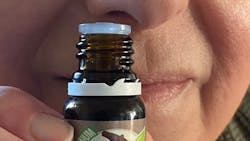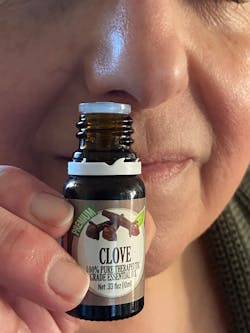Olfactory training and COVID-19-related loss of smell
Temporary loss of smell (anosmia), partial loss of smell (hyposmia), and distorted loss of smell (parosmia) are common symptoms of COVID-19 infection.1 An average of 40%–60% (up to 80%) of people who test positive for COVID-19 can have some form of smell loss.2 In cases of patients with mild COVID-19 symptoms, 64% reported loss of smell to be the only symptom experienced and therefore may better predict positivity compared with other symptoms, such as fever and cough. Many patients also describe loss of taste, which is actually loss of the ability to distinguish food flavors and is a result of loss of smell, as 90% of this ability is derived from olfaction.
The mechanism behind COVID-19-induced smell loss is thought to be the result of viral invasion of the neural olfactory epithelium. One study suggests that the novel coronavirus changes the sense of smell in patients not by directly infecting these neurons but by affecting the function of supporting cells, called sustentacular cells.3 Because these cells have large amounts of angiotensin converting enzyme 2 (ACE2) receptors—the portal of entry for SARS-CoV-2—indirect damage to the olfactory nerve and olfactory pathway occurs.4 Fortunately, the olfactory nerve is the only cranial nerve that has a natural regenerative capacity. On average, 50% of patients will recover their sense of smell in the first two to three weeks and another 40% in the first eight weeks postinfection.
According to one study, out of 113 patients who had reported a COVID-19-related alteration in smell, 55 patients reported full recovery one month after initial positive diagnosis and 46 reported partial recovery.5 Unfortunately, 10% of patients will continue to have some form of smell loss after eight weeks, and 2%–5% can have permanent anosmia.
Patients are advised to think about how the scent smells during sniffing with the intention of increasing neuroplasticity of the olfactory nerve. If smell loss persists for more than three weeks and/or the patient experiences other nasal symptoms (congestion, discharge, etc.), referral to an ENT is recommended.7 Treatment may include smell identification tests to quantify and qualify smell loss, nasal endoscopy, continued olfactory training, and counseling for safety, nutrition, and psychology.
Editor’s note: This article originally appeared in Perio-Implant Advisory, a newsletter for dentists and hygienists that focuses on periodontal- and implant-related issues. Perio-Implant Advisory is part of the Dental Economics and DentistryIQ network. To read more articles, visit perioimplantadvisory.com and subscribe at this link.
Related reading:
- Loss of smell and taste: Distinguishing between COVID-19 and the common cold/flu
- Vitamin D deficiency and COVID-19
- Lowering the transmission and spread of human coronavirus with over-the-counter products
- How does COVID-19 affect salivary flow and xerostomia?
References
- Martin M. U.S. Surgeon General blames ‘pandemic fatigue’ for recent COVID-19 surge. NPR. November 14, 2020. https://www.npr.org/transcripts/934986232
- Agyeman AA, Chin KL, Landersdorfer CB, Liew D, Ofori-Asenso R. Smell and taste dysfunction in patients with COVID-19: a systematic review and meta-analysis. Mayo Clinic Proc. 2020;95(8):1621-1631.
- Brann DH, Tsukahara T, Weinreb C, et al. Non-neuronal expression of SARS-CoV-2 entry genes in the olfactory system suggests mechanisms underlying COVID-19-associated anosmia. Sci Adv. 2020;6(31):eabc5801. doi:10.1126/sciadv.abc5801
- Fodoulian L, Tuberosa J, Rossier D, et al. SARS-CoV-2 receptors and entry genes are expressed in the human olfactory neuroepithelium and brain. iScience. 2020;23(12):101839. doi:10.1016/j.isci.2020.101839
- Mundasad S. Coronavirus: sense of smell and taste ‘improve for most.’ BBC News. July 3, 2020. https://www.bbc.com/news/health-53265280
- Hummel T, Rissom K, Reden J, Hähner A, Weidenbecher M, Hüttenbrink KB. Effects of olfactory training in patients with olfactory loss. Laryngoscope. 2009;119(3):496-499. doi:10.1002/lary.20101
- Hopkins C, Alanin M, Philpott C, et al. Management of new onset loss of sense of smell during the COVID‐19 pandemic – BRS Consensus Guidelines. Clin Otolaryngol. 2021;46(1):16-22. doi:10.1111/coa.13636
About the Author

Scott Froum, DDS
Editorial Director
Scott Froum, DDS, a graduate of the State University of New York, Stony Brook School of Dental Medicine, is a periodontist in private practice at 1110 2nd Avenue, Suite 305, New York City, New York. He is the editorial director of Perio-Implant Advisory and serves on the editorial advisory board of Dental Economics. Dr. Froum, a diplomate of both the American Academy of Periodontology and the American Academy of Osseointegration, is a volunteer professor in the postgraduate periodontal program at SUNY Stony Brook School of Dental Medicine. He is a PhD candidate in the field of functional and integrative nutrition. Contact him through his website at drscottfroum.com or (212) 751-8530.

